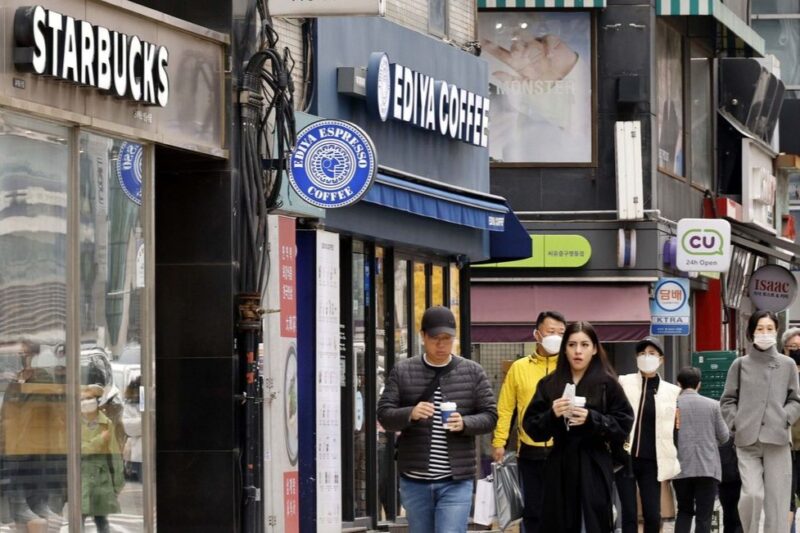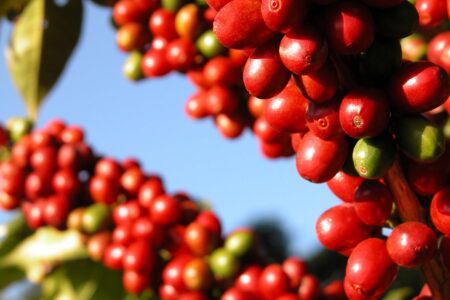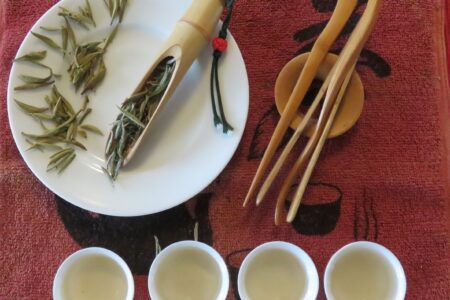South Korea’s coffee market: optimistic yet intensely competitive

South Korea’s coffee market is one of the most competitive in the world with international and domestic chains all fighting for throat share. Image: Kafelaku Coffee
With one of the world’s highest coffee consumption per capita, South Korea lures the best coffee chains in business to the local market. Although the opportunities are enormous, success is not entirely guaranteed as the coffee market in South Korea is in transition due to rapidly increasing competition and rising labour costs. By Vladislav Vorotnikov
Coffee is so loved in South Korea that the slogan “Korea is a Coffee Republic” has become viral on social media networks over the past few years. Per capita consumption stands at 405 cups, more than twice above the global average of 152 cups, Euromonitor International calculated.
The Korean Economic Institute of America put the consumption at as high as 512 cups per year. One way or another, in terms of coffee consumption per adult, South Korea is ranked the world’s second, following only France.
Coffee accounts for 30.8 percent of the total South Korean beverage market, which is even higher than the share of carbonated drinks of 25.5 percent, the Korean Food and Drug Safety Ministry estimated.
The key factor behind the soaring popularity of coffee in South Korea is a busy corporate and lifestyle culture, Taeyoung Lee, a local analyst, noted. In recent years, it has also been complemented by the high accessibility of coffee, as coffee shops in the country can be found virtually on every corner.
A study conducted by the Ministry showed that in 2022, coffee sales in South Korea were valued at KRW 5.7 trillion (USD $4.3 billion), making it the world’s third-largest coffee market.
Starbucks is the undisputed market leader and a symbol of the country’s coffee culture. After entering the country in 1999, the company swiftly conquered the hearts and minds of local coffee lovers. Starbucks sales are consistently trending upward, reaching a staggering KRW 2.59 trillion ($1.9bn) in 2022, against KRW 1.93 trillion ($1.47bn) in 2020 and KRW 2.38 trillion ($1.82bn) in 2021. With 1,750 stores all over the country, South Korea is Starbucks’ fourth largest market after exceeding Starbucks Japan in 2022, just behind the United States, China, and Canada.
A battleground of franchises
International coffee chains flock to South Korea to capitalise on the exceptional demand for coffee. The official figures indicated that the number of coffee brands present in the country jumped from only 390 in 2020 to 852 in 2022, and the trend is yet to wind down. Against this background, the total number of coffee shops, coffee-to-go points, and cafés reached the historic record of 99,000 outlets at the end of 2022.
Local press reported that South Korean market newcomers dream of “becoming the second Starbucks.” Although matching Starbucks’ store presence is hardly within grasp, new chains can still get their piece of the ‘coffee pie’.
Canadian coffee brand Tim Hortons, which launched in South Korea in December 2023, announced that it sold 300,000 doughnuts and over 100,000 cups of coffee within a month of opening. The company has swiftly launched three more outlets and, at the time of writing, was on the fast track to putting the fifth into operation.
Peet’s Coffee, one of the top three coffee brands in the western part of the United States, registered its trademark in South Korea in May 2023 and is preparing to open its first outlets. Intelligentsia, one of the top three specialty coffee brands in the United States, is also preparing to enter South Korea. When Intelligentsia opens a store there, it will be the brand’s first store outside the United States.
Growth comes at its own price. Local publication, Chosun, citing its own sources in the industry, reported that while the upward trend in the coffeehouse market continues, the number of coffee shops that closed in 2023 appeared to be the highest ever, as not everyone is ready to withstand competition.
ome brands that have entered the South Korean market in the previous few years have found it challenging to scale up their businesses. Chosun, for example, said that Japan’s Percent Coffee, Vietnam’s Kong Café, and Denmark’s April Coffee are among the brands that have entered the market in the previous years and still have a relatively small presence in the market.
On the other hand, ultra-low-cost coffee brands such as Mega Coffee and Compose have been expanding their operations in the market.
Despite being geographically small, specialist coffee and tea shop chains in South Korea have shown a remarkable 11.92 percent compound annual growth rate for the outlet growth from 2018 to 2023, Kevin Han, research analyst with Euromonitor International, commented. “This growth is heavily influenced by the emergence of low-priced coffee brands and their aggressive outlet expansion strategies.”
As expected, the fight for customers eventually undermines revenues across the board. “As these brands have competed for the same market share by entering the same location, there has been a noticeable decrease in sales per outlet for each low-priced coffee brand in the second half of 2023, indicating a decrease of consumer visits per outlet due to the fierce competition,” Han said.
To address this challenge, low-priced coffee brands have diversified their menus by adding bakery and dessert items. This strategic move aims to avoid a decline in sales per outlet by encouraging higher average customer spending, and this trend is expected to continue, he said.
In the last couple of years, the South Korean coffee market has also witnessed a surge in the popularity of specialty coffee. This is evidenced by the sales dynamics of Paul Bassett, the leader in this segment.
Paul Bassett’s sales have reached KRW 145.6 billion ($111m) in 2022 from KRW 107.5 billion ($82m) in 2021, which increased from KRW 81.3 billion ($62m) in 2020. The figures are on the rise as a growing number of Korean customers seek better taste features.
A spokesperson for the company said, “Our greatest competitiveness is the high level of quality shown in all our stores. In the future, we plan to operate specialised stores or expand our product range to better suit customer tastes.”
There are other signs that the market players believe the growth opportunities in the premium segment of the South Korean coffee market are far from being exhausted.
Lotte Department Store recently announced that it had exclusively secured the domestic franchise and distribution rights for Bacha Coffee, a brand that originated in Marrakech, Morocco, and currently operates a total of 18 stores in nine countries, including Singapore, France, Hong Kong, and the United Arab Emirates.
Local press reported that Lotte Department Store CEO, Jeong Jun-ho, spent about 18 months personally persuading executives at Basha Coffee’s headquarters in Singapore to import its coffee. The exclusive domestic franchise and distribution rights contract was signed in September 2023, and the first store in the country is scheduled to open in July 2024.
Transition stage
While interest in specialty coffee remains high, within the overall coffee shop segment, the
main emphasis is no longer on further improving taste.
“The Korean coffee market is undergoing a transition, shifting its focus from the taste of specific beans and individual coffee products to considerations such as convenience, pricing, new offerings, and ambience,” Han said. “Consequently, there is a notable expansion in the market towards offering a variety of beverages and bakery items, accompanied by a strong emphasis on interior design and distinctive outlet concepts,” he noted.
This diversification leads to the continuous development of Korean specialist coffee and tea shops and the café market, which, according to Han, is predicted to grow at a 3.75 percent compound annual growth rate in retail value between 2023 and 2028.
Another powerful trend, said Taeyoung Lee, is that Korean coffee lovers are increasingly becoming more health-conscious.
As a result, pre-brewed coffee was the only segment where sales have dropped in the past few years, as customers were wary of sugar and flavouring content. Since 2018, pre-brewed coffee sales have dropped by roughly 16 percent.
“The growth of coffee franchise brands with a low-price strategy and the tendency to prefer coffee shops such as cafés have had an impact on the decline in the size of the pre-brewed coffee market,” explained Lee.
Losing identity
Based on the current trends and dynamics observed in the Korean coffee market, the outlook remains optimistic yet competitive, Han said. However, serving coffee is no longer enough to succeed in this business in Korea.
In 2023, Euromonitor International observed that independent cafés, with a focus on food, bakery and dessert offerings, exhibited a higher year-on-year growth rate in terms of value and transactions compared to independent specialist coffee and tea shops that mainly focused on coffee and beverage products.
“This trend highlights an increasing significance of bakery and desserts and suggesting a new transition in the Korean coffee market. Therefore, in the forecasted period, not only are specialist coffee and tea shops continually introducing bakery products, but independent cafés would also improve the quality of bakery and dessert offerings as a core differentiation,” Han explained.
Additionally, most specialist coffee and tea shops are transitioning from using baristas to brew coffee to using high-priced coffee machines, primarily to manage labour costs, he added. To a degree, this trend is causing coffee shops to lose their identity.
Han shared that, despite the benefits of operational standardisation, he “firmly believes this shift has led to a loss of differentiation among specialist coffee and tea shops, intensifying competition by making entry into the Korean coffee market relatively easier for both domestic and international brands.”
In the long run, this trend may offer additional business development opportunities for those players that are contemplating entering the Korean coffee market.
“There may be an increase in the entry of international chained specialist coffee and tea brands in upcoming years, while domestic brands focus on improving product offerings and atmosphere to emphasise their unique selling points and to deliver more personalised and new experiences to enhance consumer engagement,” said Han.
- Vladislav Vorotnikov is a Batumi, Georgia-based multimedia B2B freelance journalist writing about the tea and coffee industries since 2012.



